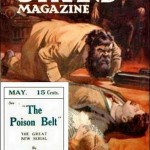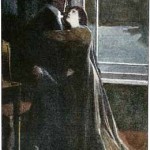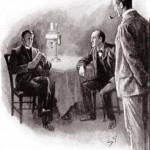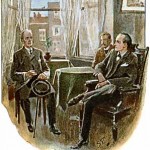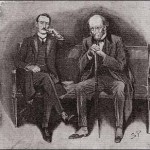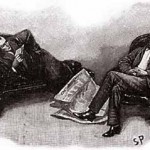“But why should he think that this disease which he has contracted is Eastern?”
“Because, in some professional inquiry, he has been working among Chinese sailors down in the docks.”
Mr. Culverton Smith smiled pleasantly and picked up his smoking-cap.
“Oh, that’s it–is it?” said he. “I trust the matter is not so grave as you suppose. How long has he been ill?”
“About three days.”
“Is he delirious?”
“Occasionally.”
“Tut, tut! This sounds serious. It would be inhuman not to answer his call. I very much resent any interruption to my work, Dr. Watson, but this case is certainly exceptional. I will come with you at once.”
I remembered Holmes’s injunction.
“I have another appointment,” said I.
“Very good. I will go alone. I have a note of Mr. Holmes’s address. You can rely upon my being there within half an hour at most.”
It was with a sinking heart that I reentered Holmes’s bedroom. For all that I knew the worst might have happened in my absence. To my enormous relief, he had improved greatly in the interval. His appearance was as ghastly as ever, but all trace of delirium had left him and he spoke in a feeble voice, it is true, but with even more than his usual crispness and lucidity.
“Well, did you see him, Watson?”
“Yes; he is coming.”
“Admirable, Watson! Admirable! You are the best of messengers.”
“He wished to return with me.”
“That would never do, Watson. That would be obviously impossible. Did he ask what ailed me?”
“I told him about the Chinese in the East End.”
“Exactly! Well, Watson, you have done all that a good friend could. You can now disappear from the scene.”
“I must wait and hear his opinion, Holmes.”
“Of course you must. But I have reasons to suppose that this opinion would be very much more frank and valuable if he imagines that we are alone. There is just room behind the head of my bed, Watson.”
“My dear Holmes!”
“I fear there is no alternative, Watson. The room does not lend itself to concealment, which is as well, as it is the less likely to arouse suspicion. But just there, Watson, I fancy that it could be done.” Suddenly he sat up with a rigid intentness upon his haggard face. “There are the wheels, Watson. Quick, man, if you love me! And don’t budge, whatever happens–whatever happens, do you hear? Don’t speak! Don’t move! Just listen with all your ears.” Then in an instant his sudden access of strength departed, and his masterful, purposeful talk droned away into the low, vague murmurings of a semi-delirious man.
From the hiding-place into which I had been so swiftly hustled I heard the footfalls upon the stair, with the opening and the closing of the bedroom door. Then, to my surprise, there came a long silence, broken only by the heavy breathings and gaspings of the sick man. I could imagine that our visitor was standing by the bedside and looking down at the sufferer. At last that strange hush was broken.
“Holmes!” he cried. “Holmes!” in the insistent tone of one who awakens a sleeper. “Can’t you hear me, Holmes?” There was a rustling, as if he had shaken the sick man roughly by the shoulder.
“Is that you, Mr. Smith?” Holmes whispered. “I hardly dared hope that you would come.”
The other laughed.
“I should imagine not,” he said. “And yet, you see, I am here. Coals of fire, Holmes–coals of fire!”
“It is very good of you–very noble of you. I appreciate your special knowledge.”
Our visitor sniggered.
“You do. You are, fortunately, the only man in London who does. Do you know what is the matter with you?”
“The same,” said Holmes.
“Ah! You recognize the symptoms?”
“Only too well.”

